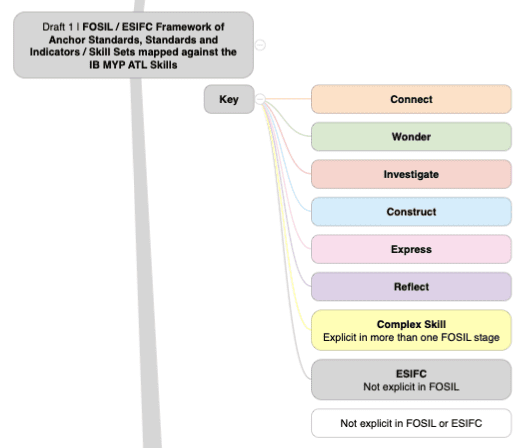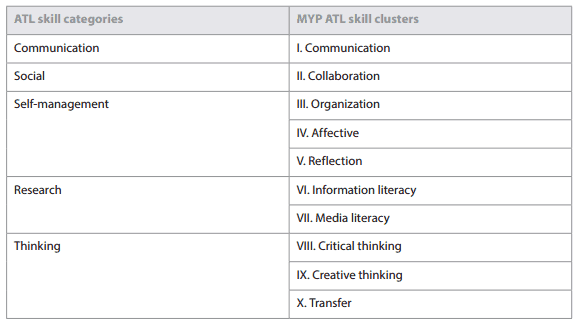Integrating FOSIL with MYP ATLs
Home › Forums › Skills, skills frameworks and stages in the FOSIL Cycle › Integrating FOSIL with MYP ATLs
- This topic has 16 replies, 3 voices, and was last updated 3 years, 5 months ago by
 Jenny Toerien.
Jenny Toerien.
-
AuthorPosts
-
12th February 2021 at 10:14 am #36098
I have added the key (Figure 1) to the A3 posters (which are attached below and are legible at 400% – I will also explore what exporting the maps as a website means).
Figure 1: FOSIL Skill Sets and ATL Skills Key

I will update this post – possibly later this morning – with my key takeaways from this enormously valuable exercise.
16th February 2021 at 11:05 pm #36467I promised to post about the handful of exceptions mentioned above and, alongside this, I want to share a few insights I had about both the ATLs and FOSIL/ESIFC in the process of trying to integrate them. It is such a complex topic and I find that I have so much I want to say that I have divided it into three posts:
- Issues I have with the ATLs (this post)
- Individual ATL skills that are not covered by FOSIL and the ESIFC
- Potential to develop FOSIL further (lessons from the ATLs)
Issues I have with the ATLs
For reference, these are the ATL categories and clusters:

Issue 1: I must confess to not entirely understanding the logic behind the ATL Categories and Clusters. They are clearly Good Things Every Student Should Be Able To Do, but can be quite confusing and overlapping. For example:
- effective collaboration relies heavily on strong communication skills, as evidenced by the fact that Give and receive meaningful feedback appears in exactly the same words in both categories, and Collaborate with peers and experts using a variety of digital environments and media appears as a communication skill NOT a collaboration skill, despite starting with the word collaborate… It is not clear to me why these are not just separate clusters but completely separate categories. The placement of Collaborate with peers… in communication tells us that it is not intended to be a division into two categories between communicating with an audience and communicating with your peers, so I am just confused.
- Research involves considerable critical and creative thinking, organization and reflection and, as Carol Kuhlthau will tell you, the research process follows a recognizable emotional journey which requires affective skills to navigate appropriately. These categories are not as separate as they appear on first contact with the ATLs.
Beyond this, some individual ‘skills’ are quite small things which, while important, are more like habits, such as Bring necessary equipment and supplies to class while others are HUGE and would need to be carefully developed in stages over a number of years, such as Locate, organize, analyse, evaluate, synthesize and ethically use information from a variety of sources and media (including digital social media and online networks). I’m sure it isn’t intentional, but the effect of having a list of 140 skills that (on some level – although I do know the IB don’t require this at skill level) need to be ticked off is that vastly different ‘skills’ like these two are somehow equated in terms of value and the time, effort and skill on the part of the educators involved that it would take to help students to master them.
Issue 2: There are a couple of skills that seem to be more subject specific than others and it isn’t clear why these are included and not others. The ones I am thinking of are:
- Use and interpret a range of discipline-specific terms and symbols. Presumably this includes, for example, vocabulary for MFL as well as subject specific terminology. Does it include ‘command terms’, which are often similar across subject boundaries (and if it does, why is mathematical notation singled out for a separate skill, below. If it doesn’t, why is ‘subject-specific vocabulary included but not ‘command terms’?).
- Understand and use mathematical notation. Why is mathematical notation is different to discipline specific terms and symbols, above – maybe because it is used across a number of disciplines?
Having included these subject specific skills however, the ATLs DON’T then include, for example,
- anything about using correct spelling punctuation and grammar (is that intended to be tied up in Use appropriate forms of writing for different purposes and audiences perhaps?)
- working with graphs, charts or diagrams
- working with tools, laboratory equipment, instruments or artistic materials.
I am not suggesting that these should be part of the ATLs, I just wonder whether having some reference to subject specific skills/ content within them leaves the door open to “why this and not that?”. Better, perhaps, to allow the ATLs to sit alongside subject specific skill sets and not reference them at all?
Issue 3: Many teachers (and some librarians) struggle with the idea of inquiry and tend to equate it to Research, which is a VERY woolly term with a wide range of definitions. The Merriam-Webster dictionary alone gives these three (among others):
- careful or diligent search
- studious inquiry or examination especially : investigation or experimentation aimed at the discovery and interpretation of facts, revision of accepted theories or laws in the light of new facts, or practical application of such new or revised theories or laws
- the collecting of information about a particular subject
and the OUP Dictionary of Education gives this (which is closer, perhaps, to inquiry):
The systematic search for answers to certain questions, often using empirical evidence but also using logical arguments and reflection on social understandings. The search may aim at discovering facts, putting forward theories, increasing understanding, and/or changing practice.
It really doesn’t help our cause that the ATLs seem to equate Research with Information Literacy and Media Literacy alone, when for many classroom colleagues inquiry means research and research is the only part of education that librarians can help with. The MYP is an inquiry-based approach to learning (which, as Darryl has said before, is a stance not an activity) and inquiry embraces ALL of the ATLs (well, actually, almost all – more on this in the next post). Including generally fairly poorly understood terms like Information Literacy and Research in the skills framework muddies the waters for many colleagues.
From our perspective, Research (as it seems to have been defined for the purpose of the ATLs) largely equates to the Investigate stage of FOSIL, with some overlap into Construct. The advantage of placing this within an inquiry cycle (rather than linking it to a very broad term like Research) is that it is immediately clear what sorts of activities and skills we are talking about, when and why students need them during inquiry – AND that this is just one stage of inquiry.
Issue 4: The final issue is that the ATLs are not arranged in a logical order in terms of where students might encounter them during an inquiry, so they feel quite random and when I am working with a teacher on an inquiry and we need to decide which ATLs to ‘put on the unit plan’ to satisfy the requirement it does feel pretty random whether we choose, for example, the Give and receive meaningful feedback from Collaboration or Communication. This can devalue the ATLs and make them a tick box exercise, whereas I’ve had some amazing conversations with colleagues about whether their inquiry focuses on Wonder or Investigate, and how they/we are supporting students to develop their skills in that area. This may be down to the fact that I have a deeper understanding of FOSIL than of the ATLs, but I strongly feel that that is because it is rooted in the inquiry process and supported by a CONTINUUM of skills that show me how I might expect my students to develop as they progress through the school. I don’t have to work out how an MYP novice at Locate, organize, analyse, evaluate, synthesize and ethically use information from a variety of sources and media (including digital social media and online networks) might look different from an MYP expert – and how that ‘expert’ might continue to develop that skill at DP level. I have a road map.
This lack of order (in terms of progression through an inquiry) is very evident in Darryl’s mind map (even when viewing the version that is a bit small to read in this post. You can see from the spread of colours that:
- Communication Skills are largely Express and Investigate, with a scattering of Construct (so starting towards the middle/end of the inquiry process).
- Collaboration Skills are largely dealt with through the wider ESIFC rather than FOSIL explicitly (because these happen throughout inquiry rather than at any one stage in particular).
- Self-management is mostly from the wider ESIFC (see above) with a couple of skills from Reflect and Construct.
- Research skills unsurprisingly often fall into several stages of the process – in FOSIL/ESIFC we find it helpful to separate them into different skills for different stages of the process.
- Thinking skills are, again, found at many different stages (although tend more towards Construct and Express), but the individual named skills were easier to assign to definite stages. This is the only Category in which Wonder Skills are explicitly found, and one of two containing Connect.
- Transfer skills are largely multi-stage, but this is the other category with a Connect skill.
Key points for me were: Connect and Wonder were under-represented and only mentioned in the final two categories when, looking at the order students meet them within inquiry I might have expected them to be first. Every category contained a mix of inquiry stage skills, with many individual skills running across several stages, making it harder to isolate them and design appropriate interventions to support them at appropriate times. Personally to use this framework effectively I would need to design an appropriate inquiry, focussing on where I felt students needed support to make progress, and then work backwards to see which ATLs I had inadvertently supported, which seems very backwards. With FOSIL I can decide which stage (or stages) I want to focus on, think about where students are within the skills framework, where we would like them to be and how we might move them forward. This means my framework is supporting my teaching, not becoming an administration exercise (but see my comments on Issue 4 – I fully recognise that this may be partly down to my level of experience with the two systems, but I don’t think that is the whole problem).
Caveat
All systems will have their strengths and weaknesses and it may seem that I am being unfair by picking on the weaknesses of the ATLs without addressing their strengths (and there are certainly some). However, I think part of the problem is that I can’t find a rationale for the categories and clusters anywhere (I’m sure a lot of thought went into them and there must be one somewhere – if someone could direct me to it I would be very grateful). So when I feel frustrated and wonder why they did it a certain way I can’t engage with the rationale, and because there isn’t actually a well-developed framework of skills behind the list of 140, I can’t see what the authors really intended in terms of the development of that skill.
I will try to post over the next few days on:
- Individual ATL skills that are not covered by FOSIL and the ESIFC
- Potential to develop FOSIL further/ lessons from the ATLs
-
AuthorPosts
- You must be logged in to reply to this topic.


